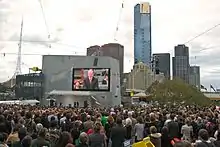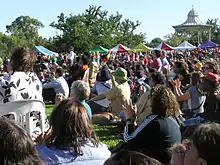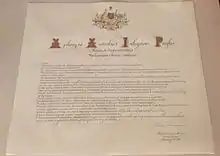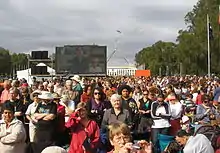Apology to Australia's Indigenous peoples
On 13 February 2008, the Parliament of Australia issued a formal apology to Indigenous Australians for forced removals of Australian Indigenous children (often referred to as the Stolen Generations) from their families by Australian federal and state government agencies. The apology was delivered by Prime Minister Kevin Rudd.[1]



Stances on the proposed apology
For more than a decade since the Bringing Them Home report was submitted to Liberal Prime Minister John Howard, he and his coalition colleagues consistently rejected calls for a formal government apology, though some coalition government members stated that they were personally sorry for the outcomes of the policy. They were concerned that a formal apology could be construed as an admission of deliberate wrongdoing, rather than acknowledging that the originally stated intentions of the government were believed to be in the interests of the children and their futures. Howard and his supporters were concerned that such an apology would suggest that the government would be admitting liability in any duty-care legal proceedings.
After the 2007 federal election the newly installed Labor Prime Minister Kevin Rudd announced on 11 December 2007 that the government would make an apology to Indigenous Australians, the wording of which would be decided in consultation with Aboriginal leaders.[2]
The Liberal Party opposition was split on the issue. Its leader Brendan Nelson initially said that an apology would risk encouraging a "culture of guilt" in Australia. However, support for an apology was expressed by other senior Liberals, such as Malcolm Turnbull, Peter Costello, Bill Heffernan, and former Liberal Prime Minister Malcolm Fraser.[3] Former Liberal minister Judi Moylan said: "I think as a nation we owe an apology. We shouldn't be thinking about it as an individual apology — it's an apology that is coming from the nation state because it was governments that did these things."[4] Nelson later said that he supported the government apology.[5] Following a party meeting, the Liberal Party as a whole expressed its support for an apology, and it achieved bipartisan consensus. Nelson stated: "I, on behalf of the Coalition, of the alternative government of Australia, are [sic] providing in-principle support for the offer of an apology to the forcibly removed generations of Aboriginal children."[6]
Lyn Austin, chairwoman of Stolen Generations Victoria, expressed why she believed an apology was necessary, recounting her experiences as a stolen child:
I thought I was being taken just for a few days. I can recall seeing my mother standing on the side of the road with her head in her hands, crying, and me in the black FJ Holden wondering why she was so upset. A few hundred words can't fix this all but it's an important start and it's a beginning[...] I see myself as that little girl, crying myself to sleep at night, crying and wishing I could go home to my family. Everything's gone, the loss of your culture, the loss of your family, all these things have a big impact.[7]
Apology text
At 9:30am on 13 February 2008, Rudd presented the apology to Indigenous Australians as a motion to be voted on by the house. The form of the apology was as follows:[8][9]
I move:
That today we honour the Indigenous peoples of this land, the oldest continuing cultures in human history.
We reflect on their past mistreatment.
We reflect in particular on the mistreatment of those who were Stolen Generations—this blemished chapter in our nation's history.
The time has now come for the nation to turn a new page in Australia's history by righting the wrongs of the past and so moving forward with confidence to the future.
We apologise for the laws and policies of successive Parliaments and governments that have inflicted profound grief, suffering and loss on these our fellow Australians.
We apologise especially for the removal of Aboriginal and Torres Strait Islander children from their families, their communities and their country.
For the pain, suffering, and hurt of these Stolen Generations, their descendants and for their families left behind, we say sorry.
To the mothers and the fathers, the brothers and the sisters, for the breaking up of families and communities, we say sorry.
And for the indignity and degradation thus inflicted on a proud people and a proud culture, we say sorry.
We the Parliament of Australia respectfully request that this apology be received in the spirit in which it is offered as part of the healing of the nation.
For the future we take heart; resolving that this new page in the history of our great continent can now be written.
We today take this first step by acknowledging the past and laying claim to a future that embraces all Australians.
A future where this Parliament resolves that the injustices of the past must never, never happen again.
A future where we harness the determination of all Australians, Indigenous and non-Indigenous, to close the gap that lies between us in life expectancy, educational achievement, and economic opportunity.
A future where we embrace the possibility of new solutions to enduring problems where old approaches have failed.
A future based on mutual respect, mutual resolve and mutual responsibility.A future where all Australians, whatever their origins, are truly equal partners, with equal opportunities and with an equal stake in shaping the next chapter in the history of this great country, Australia.
— Kevin Rudd, Prime Minister of Australia, 13 February 2008, at a sitting of the Parliament of Australia.
| Wikimedia Commons has media related to Apology to the Stolen Generations. |
| Wikinews has related news: |
The text of the apology did not refer to compensation to Aboriginal people as a whole, nor to members of the Stolen Generations specifically. Rudd followed the apology with a 20-minute speech to the house about the need for this action.[10][11] The government's apology and his speech were widely applauded among both Indigenous Australians and the non-indigenous general public.[12][13]
Opposition leader's parliamentary reply and reaction

Brendan Nelson also delivered a 20-minute speech. He endorsed the apology but in his speech Nelson referred to the "under-policing" of child welfare in Aboriginal communities, as well as a host of social ills blighting the lives of Aboriginal people.
The Alice Springs Crown Prosecutor Nanette Rogers with great courage revealed to the nation in 2006 the case of a four-year-old girl drowned while being raped by a teenager who had been sniffing petrol. She told us of the two children – one a baby – sexually assaulted by two men while their mothers were off drinking alcohol. Another baby was stabbed by a man trying to kill her mother.[15]
Nelson's speech was considered controversial and received mixed reactions. Thousands of people who had gathered in public spaces in Canberra and Melbourne to hear the apology turned their backs on the screens that broadcast Nelson speaking. In Perth, people booed and jeered until the screen was switched off. In Parliament House's Great Hall, elements of the audience began a slow clap, with some finally turning their backs. There were similar reactions and walk-outs in Sydney and elsewhere.[14]
After the ceremony, the House of Representatives unanimously adopted the proposed apology motion. Six members of Nelson's opposition caucus — Don Randall, Sophie Mirabella, Dennis Jensen, Wilson Tuckey, Luke Simpkins, and Alby Schultz — left the House in protest at the apology.[14] Peter Dutton was the only Opposition front bencher to abstain from the apology.[16]
Response
Dr. Tom Calma, Aboriginal and Torres Strait Islander Social Justice Commissioner of the Australian Human Rights and Equal Opportunity Commission, gave a speech formally responding to the government's apology.[17] Calma thanked the Parliament for acknowledging and paying respects to the Stolen Generations, stating "By acknowledging and paying respect, Parliament has now laid the foundations for healing to take place and for a reconciled Australia in which everyone belongs."[17] However, Calma did note that there were many recommendations in the Bringing Them Home report that, as of 2009, had not yet been implemented.[18]
Senate consideration
Later that day, the Senate considered a motion for an identical apology. The Leader of the Greens, Senator Bob Brown, attempted to amend the motion to have it include words committing parliament to offering compensation to those who suffered loss under past indigenous policies, but was opposed by all the other parties. The original motion was passed unanimously.[19][20]
See also
References
- Lewis, Steve (27 January 2008). "Kevin Rudd racing to historic Aboriginal apology". Daily Telegraph (Australia). Retrieved 27 January 2008.
- Peatling, Stephanie (11 December 2007). "How to say sorry and heal the wounds". The Sydney Morning Herald. Retrieved 11 December 2007.
- Lewis, Steve (1 February 2008). "Liberals ready to think about saying sorry". Herald Sun. Archived from the original on 3 February 2008.
- Schubert, Misha (30 January 2008), "Liberal division grows on apology", The Age.
- Gartrell, Adam (8 February 2008). "Howard will not attend apology". The Sydney Morning Herald. Archived from the original on 27 October 2009.
- Hoare, Daniel (7 February 2008). "Opposition joins rush to say sorry". ABC News. Retrieved 24 November 2016.
- Cooke, Dewi (1 February 2008), "'Sorry' statement should acknowledge cultural loss, says state leader", The Age.
- Lo, Ping (12 February 2008). "The words Rudd will use to say 'sorry'". abc.net.au. Retrieved 24 November 2016.
- Welch, Dylan (13 February 2008). "Kevin Rudd says sorry". The Sydney Morning Herald. Archived from the original on 27 February 2010.
- "Video: Watch Kevin Rudd's full apology". Retrieved 14 February 2008.
- "Full text of Kevin Rudd's speech". News Limited. 13 February 2008. Archived from the original on 17 February 2008. Retrieved 14 February 2008.
- "Thunderous applause in Sydney for Rudd's speech", Australian Associated Press, The Sydney Morning Herald, 13 February 2008.
- McKenny, Leesha, "Speech gets standing ovation in Redfern", The Sydney Morning Herald, 13 February 2008.
- "Fury over Nelson's 'sorry' response". The Age. 13 February 2008. Retrieved 12 April 2012.
- The Sydney Morning Herald, 13 February 2008. Retrieved 12 April 2012.
- "To some he's the messiah, to others a duplicitous polly". The Age. 6 October 2009. Retrieved 24 May 2014.
- "Response to government to the national apology to the Stolen Generations". Retrieved 18 May 2020.
- "Apology to Australia's Indigenous peoples". Retrieved 18 May 2020.
- "Senate: Official Hansard, No. 1, 2008" (PDF). Parliament of Australia, Hansard. 13 February 2008. Archived from the original (PDF) on 16 February 2012.
- Crawshaw, David (13 February 2008). "Brown defeated in 'sorry' compo bid". news.com.au. Archived from the original on 16 December 2008.
Further reading
- Footage of the National Apology to the Stolen Generations
- Footage of the National Apology to the Stolen Generations, with Kevin Rudd's subsequent speech
- Stolen Generation apology text
- Apology to Australia's Indigenous peoples from the Australian Institute of Aboriginal and Torres Strait Islander Studies
- Defining moments in Australian History: National Apology from the National Museum of Australia